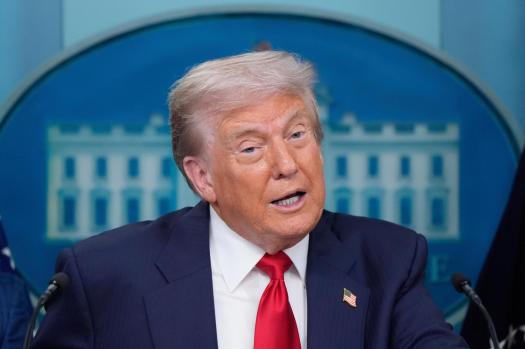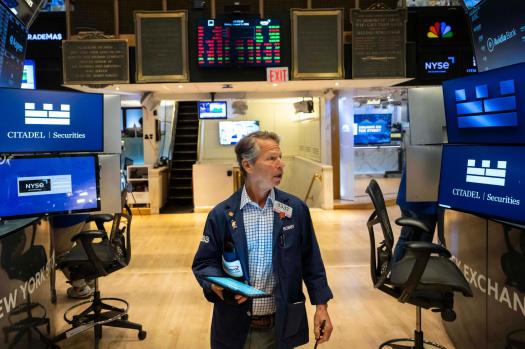By Associated Press Technology Writer Michael Liedtke
AP’s San Francisco Less than two weeks after ordering the Silicon Valley pioneer to fire the CEO who was hired to revive the faltering chipmaker, President Donald Trump now wants the U.S. government to acquire a portion of Intel. Should the objective be accomplished, the investment would increase the Trump administration’s engagement in the computer sector as the president increases pressure on more American businesses to produce their goods in the country rather than relying on foreign suppliers.
In exchange for converting federal funding that were promised to Intel under President Joe Biden, the Trump administration is negotiating to acquire a 10% interest in the company. In a nation that continues to have the greatest economy in the world, the U.S. government would become one of Intel’s biggest shareholders if the merger is finalized, erasing the conventional boundaries between the public and private sectors.
Trump has been using his influence to restructure the operations of significant computer chip companies during his second term. In exchange for export licenses, the government is demanding that Nvidia and Advanced Micro Devices, two businesses whose processors are fueling the artificial intelligence frenzy, pay a 15% commission on their chips sold in China.
Trump’s ambition to increase chip manufacturing in the United States, which has been at the center of his global trade battle, is another factor fueling his interest in Intel. The president thinks the United States will be in a better position to keep up its technological edge over China in the race to develop artificial intelligence if the nation’s reliance on chips made elsewhere is reduced.
In an unambiguous message on August 7, the president demanded that Intel CEO Lip-Bu Tan step down, less than five months after the Santa Clara, California-based business had hired him. Reports expressing national security concerns regarding Tan’s prior venture capital involvement in Chinese tech businesses sparked the demand. However, after Tan publicly pledged his loyalty to the United States in a letter to Intel employees and met with the president at the White House, who praised the Intel CEO for having a compelling tale, Trump withdrew his support.
Related Articles
-
New work rules could deny food stamps to thousands of veterans
-
Even at the grocery store, Texas troopers don t let Democrats out of sight after walkout
-
Pure partisan advantage : Trump leverages presidential power to help his party in the 2026 midterms
-
Immigrants seeking lawful work and citizenship are now subject to anti-Americanism screening
-
Nebraska announces plan for immigration detention center dubbed the Cornhusker Clink
Although the business has not commented on the prospect of the US government acquiring a sizable stake, Intel might not have much of an option given its current precarious position. Following decades of expansion as its processors drove the surge in personal computers, the company had a downturn after failing to capitalize on the move to the mobile computing era brought about by the 2007 release of the iPhone.
During a recent artificial intelligence frenzy that has benefited Nvidia and AMD, Intel has lagged even worse. Tan went on a cost-cutting rampage after the company lost almost $19 billion last year and a another $3.7 billion in the first half of this year. Tanex anticipates that Intel will employ roughly 75,000 people by the end of this year, a 25% decrease from the end of the previous year.
The U.S. government becoming a major shareholder in a well-known corporation is uncommon but not unheard of. During the Great Recession in 2008, one of the most prominent examples was when the government gave General Motors around $50 billion in exchange for almost 60% of the company when it was about to go bankrupt. After selling its GM stock, the government ultimately suffered a loss of about $10 billion.
In an interview with CNBC on Tuesday, U.S. Commerce Secretary Howard Lutnick stated that the government will be restrained by its non-voting shares in Intel and has no plans to interfere in the company’s operations. However, other experts question if the Trump administration’s financial connections to Intel could encourage additional businesses hoping to win over the president to place larger orders for the company’s chips.
One of the largest recipients of the Biden administration’s sCHIPS and Science Act, Intel has struggled to turn things around and has fallen behind on construction projects that the program sparked.
Of the $7.8 billion promised under the incentives scheme, the corporation has received roughly $2.2 billion. Lutnick criticized the money as a giveaway, saying that it would benefit American taxpayers more if it were converted into Intel stock. Lutnick told CNBC, “We believe America should benefit from the deal.” It’s clear that this is the correct course of action.












